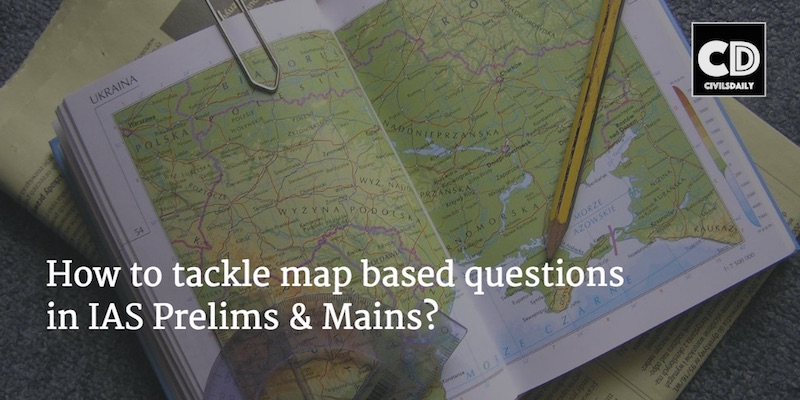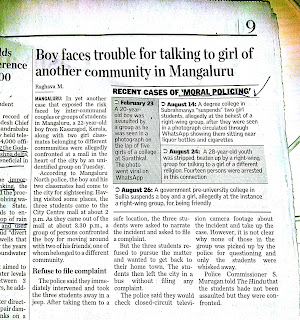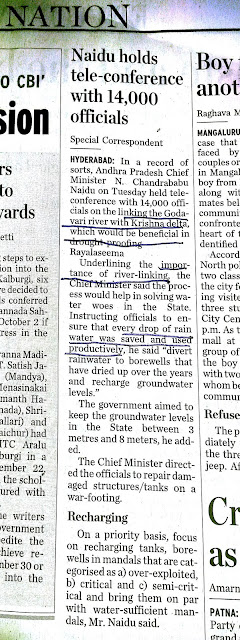The bureaucrat returns with an emphatic answer as to why should you JOIN civil services.
There are several benefits in the civil services, which you can’t get in any other profession. It is upto you to focus your attention to the positive side of the civil services or at the negative side. There are still numerous reasons to join civil services in India despite all the liberalization and globalization. Let me narrate a few of those.
1: Prestige
Imagine that you are passing on a road of a city like Delhi, Mumbai, Chennai or any major city of India and you see several vehicles passing by. There are expensive vehicles like Mercedes, BMW, or Jaguar and there is a Government vehicle of average type with red/blue light on its top with the name plate of the office/officer. Which vehicle people look at?
I am sure that most people look at the vehicle with red light. The traffic constables become alert on duty and may give a crisp salute to the officer sitting in the vehicle. A government vehicle is a sign of authority, which immediately attracts the attention of people. Similarly, a government officer immediately gets attention in big galaxies of important people.
Contrary to popular perception in urban India and media, the civil servants are highly respected by the people of India. It is because they serve people like no one else. Further, their selection process has always been transparent and fair. UPSC had always been above board for selection of candidates for top services. A PM/CM can make anyone a Cabinet Minister, Supreme Court Collegium can make anyone a High Court or Supreme Court Judge; and anyone can be made the CEO/CMD of a company but nobody can make you an IAS, IPS or IRS officer except your own merit. Hence, people of India never doubt the ability of a civil servant. When you become part of any function of an organization, its prestige goes up and you become the central point of the function and get all the attention.
2: Power
A civil servant is the epitome of state power. You are not a government servant but the government itself. The laws may be passed by the Parliament, but are executed only through civil servants. We as IRS officers sign so many documents on behalf of President of India. Please remember that you exercise the power of the Government in India pertaining to your department. You have the authority to decide cases worth hundreds of crores and conduct search, seizure of arrest of the people who are breaking the law of the land. No wonder, the law breakers don’t want to mess with you and the law abiders look at you for taking on the law breakers. You have the original powers to implement the rule of law in this country. Only when you fail, others come into picture.
3. Job Security and Political Interference
If you are in a private sector job, you can be removed with one day notice. You are always at the mercy of the company and its top bosses. The service conditions of civil servants are determined by the Parliament and can’t be changed to his disadvantage. Their service is protected by Article 311 of the Indian Constitution according to which, he can’t be dismissed from service without an enquiry where he would be given opportunity to defend himself. He also has the option to approach the Courts, in case he has been treated unfairly. The promotion of a civil servant is not in the hands of politician, which is either time bound manner or based on seniority. The promotion committees are headed by UPSC Member/Chairman and hence you can expect utmost objectivity in promotion. You don’t have to fear anyone, if you are on the right side of the law.
Fortunately the central services like IRS are fully insulated from political interference. I have never got any call from any politician in my 25 years of my career and there has been no political interference directly or indirectly ever. The reason can be attributed to the ‘Transfer Policy’ in our department. The postings upto the rank of Additional Commissioner are made by the Chief Commissioner (Within his Zone/State) or by the Central Board of Excise and Customs (All over India) manned by all IRS officials. Even for Commissioner and Chief Commissioner, it is the Placement Committee (PC) headed by The Chairman CBEC or CBDT proposes the names for the approval of FM. If a name is not proposed by PC, no order can be made.
Similarly for posting in sensitive intelligence/investigation originations like DRI and DGCEI, the names have to be proposed by the Director General for being considered for posting. Thus the CBEC/CBDT has a sort of veto power over transfer and postings of IRS officers. If you find it unbelievable, please read the policy yourself by visiting the link Page on cbec.gov.in
Unfortunately the situation is not same in States and the IAS/IPS/IFoS officers are posted usually by CM directly. I was told by one of my IPS colleagues that in his State, an SP can’t even transfer a constable without the approval of the Minister In-charge of the district. I hope that good sense will prevail and some day they will adopt the best practices of Government of India.
4: Decent Salaries and Excellent Perks
The salaries of the government officers have become very decent in recent years. When I joined IRS in 1991, my salary was around Rs 3500 pm only. Today in 2015 my salary is around Rs 1,50,000 pm viz. 43 times time more in less than 25 years . In addition, you also get free house, car, phone, medical, Leave Travel Concession, Children Education Allowance and pension. Most of the allowances are tax free. You require at least Rs 50 lakhs of CTC to enjoy the same lifestyle in corporate. Sometime, the rental value of your government accommodation itself may be much more than the CTC of several big corporate CEOs. Who can afford to stay in Lutyens Delhi bungalows on rent?
5: Work Life Balance
While it is common to hear the ply of the civil servants that they don’t have a good personal life, it is not absolutely true. Every government department has different types of postings. Some posts (like DM, SP) require long hours of work while several posts are such where you have to find work. The salaries in both the cases are exactly the same.
Hence, if you give priority to personal life, you can always request the government to give you such assignments, where you can have more free time for yourself and the family. I have, on several occasion, requested the government for such peaceful assignments as I wanted to devote some time to teach my children and I was always given such light assignements. You also get 2/3 years of fully paid study leave, using which I did my PhD on E-Governance from IIITM Gwalior while in service. You can choose to study abroad in top university of the world and the government may finance most of the expenses.
A female government officer gets additional 2 years of fully paid Child Care Leave to take care of their children, in addition to the maternity leave. Each government officer is also entitled to upto 5 years of Extra Ordinary Leave (Unpaid) for taking care of personals needs in addition to the 20 days of Half Pay Leave and 30 days of Earned leave every year besides 5 day a week work-schedule and numerous gazetted holidays. You have lots of flexibility to choose the postings according to your needs and temperament.
6: Job Satisfaction
You must remember that civil services is not an ordinary job where you work for an organization or for a person. You work for the country and its people. The revenue collected by an IRS officer is used for the benefit of the poorest and needy and for development of infrastructure and nation.
As a police officer, you control crime in the country and hence create an atmosphere for security, growth and prosperity.
As an IAS officer, you make and implement the developmental schemes for the growth of the nation. Your job is in the nature of social service. Many billionaires like Bill Gates, Azim Premji spend billions from their own pocket to get the satisfaction of doing the social work. You have the opportunity to do so while in service and you are even paid for it decently.
7: Freedom to Work
It may not be believable, but it is a fact that you have tremendous freedom to do your work as a government officer. Each post in a government (SP, DM or Commissioner) is created and empowered by Parliament. Hence as far as you are on that chair, you have the full freedom to decide the things according to your judgment and discretion.
For example, as a revenue officer, if I get information of tax evasion and I am empowered by law to conduct search, seizure or arrest; no one can give me any direction to act or not to act. No senior officer or Minister can change the decisions taken by the appropriate legal authority without following the procedures provided by the law. For example if the order of Commissioner is wrong, you have to approach the Tribunal, High Court or Supreme Court to reverse the order. These agencies have tremendous freedom and they decide the legality of the action independently without any intervention from the government.
Even though media mostly highlights the conflicts between politicians and civil servants, in reality they work with each other without much problem. It is because the goal of civil servants and politician is one and the same. Politicians need good IAS and IPS officers who can help the state grow and become free from crime. When there is a problem, often both sides are responsible. You don’t even hear any conflict in states like MP, Chhattisgarh, Orissa, Rajasthan and even in Bihar (in Nitish Kumar regime). Most of the states have no conflict at all between officers and politicians. Good politicians and good bureaucrats always work together harmoniously and help each other. The problem between them is more personal than professional, though it is always highlighted as professional problem and politicians are blamed for the mess.
8: Diversity of Jobs
The civil services provide tremendous diversity of jobs. If you are in IAS, you can virtually head any organization in India. As secretary, you can head different ministries of the government and also different public sector undertaking, educational and research institutions.
As an IRS (C&CE) officer you work in Customs, Excise, Service Tax, Narcotics, Training, Systems etc. You even work as advocate, when you are posted in Tribunals. You also work in intelligence agencies like DRI, DGCEI, CEIB, IB or RAW. All officers may get posting in Ministries and State/Central Government and work in the policy formation.
You can get posted to international organizations like WCO, UN, WHO, World Bank IMF etc. You can take lien and become a professor or join an NGO or even start an NGO in public interest. You can write books, make films and do several other activities with the permission of government.
9: Widest Networking
The networks of civil servants are the widest in the country. As an IRS officer, my collogues are posted all over the country. We also have officers posted in several part of the world. I can call anyone and request them for any help or protocol. When you join a service, you join a family. You are like the new born baby, who is looked after by every elder of the family. You have to just request and your wishes may be fulfilled. As you grow older in service, your role is reversed and you take care of the young officers like your children.
There is also a brotherhood between all officers. I just have to pick up the phone and request my colleagues in IAS, IPS or others, and they will usually extend all types of help. Through your friends, you can approach anyone in the country, in case you need their help. The businessman, actors, leaders are all interested in networking with you, because you are always in positive to help others. It is you who have to restrict your network due to time constraints and due to its effect on performing your job professionally and impartially. Even when you retire, the network is not broken since your juniors remain in the service till almost the end of your life.
10: Post Retirement Jobs
A civil servant get the experience of the government as no one else can. It is often said in movies that an IAS (or IPS, IRS) officer can always choose to become a Minister but a Minister can’t become a civil servant. There is a great demand of such experience in the corporate, who have to deal several government departments, but they have no experience of dealing them. The retiree officers usually get very good job officers by corporate, if they choose to work later. Many of my colleagues, who have left IRS after 10-15 years of service to join corporate are getting salaries in Crores. You can even start your own consultancy firm and earn good money. Since you learn how to run the government, you can also choose to join politics and become an effective Minister or even Chief Minister (Arvind Kejriwal, Ajit Jogi) or Prime Minister (Morarji Desai). You can also become Governor, CIC, CVC, CEC or UPSC/CAT/Tax Tribunal Member/Chairman after retirement.
Conclusion
It may be a good idea to join civil services like IAS,IPS, IFS,IRS or like, if you appreciate the value of the good things that government services have to offer. However, there is no free lunch in this world. Hence there is a price to be paid for getting the good things.
Remember the old Hindi Song “Kabhi kisi ko mukammal jahan nahi milta, Kabhi zamin to kabhi asman nahi milta” (No body gets a perfect world, sometime you don’t get the earth and sometime you don’t get the sky).
If you are willing to pay the price, civil services is still one of the best options to join in India.
This article was written by Awdhesh Singh, an IRS officer with the GOI. Ref: Quora






















